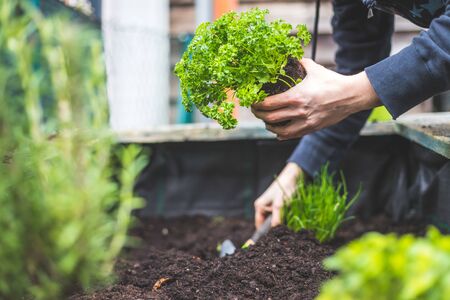Introduction: The Cultural Value of British Gardens
Gardens hold a cherished place in the heart of British culture, weaving together threads of history, tradition, and community. From the sprawling lawns of stately homes to the charming allotments nestled in towns and villages, gardens have long been more than just spaces for growing plants—they represent a unique expression of local identity and pride. These green sanctuaries provide not only beauty and solace but also serve as gathering points for neighbours and families, fostering a sense of belonging and continuity. Over centuries, gardening traditions have evolved alongside British society, reflecting changes in lifestyle, technology, and environmental awareness. As we explore the enduring significance of gardens in Britain, it becomes clear that their management—especially how waste is handled—reveals much about shifting values and innovative practices within communities.
Historic Practices: Traditional Methods of Garden Waste Disposal
For centuries, British gardeners have relied on tried-and-true methods to manage garden waste in ways that are both practical and community-minded. Before modern council collections and recycling schemes, people turned to solutions rooted in local tradition and sustainability. One of the most classic approaches was the compost heap, a familiar sight in gardens across the UK. By piling up grass clippings, leaves, and vegetable peelings in a corner of the garden, families created nutrient-rich compost to feed their soil naturally.
Bonfires were another common way to dispose of woody branches, hedge trimmings, and other bulky green waste. Often held at the end of autumn or early spring, these fires not only cleared away debris but also became neighbourhood events, bringing people together for a chat over the flames. The ashes produced were sometimes spread back onto vegetable beds as a simple fertiliser.
Sharing organic matter among neighbours was also part of traditional British gardening culture. Excess apples, pruned branches suitable for kindling, or even spare manure from those keeping chickens or horses would be passed along the street or shared via allotment networks. This spirit of cooperation helped everyone make the most out of what might otherwise go to waste.
Key Traditional Methods
| Method | Description | Community Involvement |
|---|---|---|
| Compost Heap | Piling garden waste to create homemade compost for soil enrichment | Often shared tips and compost with neighbours |
| Bonfire | Burning woody waste; ashes used as fertiliser | Became social events in some communities |
| Sharing Organic Matter | Distributing surplus produce or material to others nearby | Strengthened local bonds through sharing resources |
These historic practices highlight a resourceful and communal approach to garden waste management that valued reuse and connection as much as tidiness. While technology and regulations have changed some habits today, many British gardeners still appreciate these age-old traditions for their simplicity and sense of community.

3. Modern Innovations: Contemporary Approaches to Garden Waste
In recent years, the UK has embraced a wave of modern innovations to manage garden waste more sustainably. Local councils across England, Scotland, Wales, and Northern Ireland now play a pivotal role in encouraging eco-friendly habits among residents. These efforts are not only about keeping neighbourhoods tidy, but also about reducing landfill use and cutting carbon emissions.
Council-led Recycling Schemes
Most British councils have introduced dedicated garden waste recycling schemes. Households can sign up for regular collections of grass clippings, leaves, branches, and other green waste. The collected material is then taken to local composting facilities where it is turned into nutrient-rich soil improver or mulch. This closed-loop system helps communities cut down on waste and supports local gardening initiatives.
Garden Waste Bins and Collection Services
Distinctive brown or green bins have become a familiar sight outside British homes. Many councils offer these bins either for free or through a small annual fee. The introduction of these bins has made it easier for people to dispose of their garden waste responsibly, without resorting to burning or dumping it. Regular collection schedules—often fortnightly—encourage households to maintain their gardens while participating in sustainable waste management.
Eco-Friendly Garden Waste Management
The shift towards greener practices goes beyond council schemes. Increasingly, residents are adopting home composting solutions and using community composting sites. Educational campaigns run by local authorities and environmental groups highlight the importance of reducing waste at source, such as through mulching grass cuttings or reusing pruned branches for wildlife habitats. These contemporary approaches reflect a growing awareness of environmental responsibility in everyday British life.
4. Community Composting and Local Initiatives
Across the UK, community composting and local garden waste initiatives are becoming increasingly popular, blending time-honoured traditions with modern sustainability values. These schemes encourage residents to manage garden waste collectively, fostering a sense of neighbourhood cooperation and environmental responsibility.
The Rise of Allotments and Shared Gardens
Allotment gardens have long been a staple of British horticultural culture. Today, many allotment associations promote communal composting, where plot holders contribute green waste to shared bins or heaps. This practice not only reduces landfill but also enriches the soil for everyone’s crops, echoing historic methods while adapting to contemporary needs.
Community Compost Schemes
Local councils and grassroots organisations have launched numerous community compost schemes. These projects often provide designated sites where residents can bring their garden clippings, leaves, and prunings. Volunteers manage the process, turning waste into valuable compost that is distributed back into the community or used for public green spaces.
Benefits of Community Approaches
| Traditional Practices | Modern Innovations |
|---|---|
| Manure heaps on family farms | Neighbourhood compost hubs |
| Gardeners sharing surplus produce | Online platforms for sharing composting tips |
| Allotment-based shared bins | Council-supported collection points |
Building Local Connections
These initiatives do more than manage waste—they bring people together. Workshops on composting techniques, seed swaps, and gardening clubs are common features, helping neighbours bond over shared goals. This communal spirit reflects both the historic British love of gardening and a forward-looking commitment to sustainable living.
5. Shifting Attitudes: Environmental Awareness and Policy Changes
In recent decades, the British approach to garden waste has undergone a significant transformation, largely driven by growing environmental awareness and evolving government policies. As sustainability becomes a national priority, both individuals and local authorities have begun to reconsider traditional disposal methods in favour of more eco-friendly practices.
Historically, garden waste was often burned or simply discarded in landfill sites, with little thought given to long-term environmental consequences. However, public consciousness around issues such as climate change, soil health, and air quality has prompted a shift in attitudes. Many communities now actively promote composting at home and encourage residents to reduce waste through responsible gardening techniques.
The role of government policy has also been crucial in this evolution. Legislation such as the Waste Framework Directive and various local council initiatives have introduced stricter controls on garden waste management. These regulations have led to the widespread adoption of green bin collections, where organic matter is separated for composting or bioenergy production rather than being sent to landfill.
Moreover, educational campaigns by councils and environmental groups have helped raise awareness about the benefits of recycling garden waste and using peat-free composts. Such efforts are reinforced by financial incentives or penalties designed to discourage environmentally harmful behaviours.
This combination of grassroots environmentalism and top-down policy changes has made sustainable garden waste management an integral part of modern British life. The result is a noticeable decline in fly-tipping and open burning, replaced instead by community composting projects and innovative recycling schemes that reflect a deeper respect for the environment.
6. Tradition Meets Progress: Blending Old and New Solutions
In recent years, the most effective garden waste management practices in the UK have emerged from a thoughtful blend of time-honoured traditions and modern innovations. This approach not only addresses environmental concerns but also honours local heritage and community values.
Community Composting Hubs
Many British towns now combine traditional composting knowledge with modern community initiatives. For example, village green projects often use digital platforms to organise compost drop-off points, where residents bring their green waste. Local volunteers—sometimes drawing on decades of gardening experience—manage these sites using both established composting techniques and contemporary temperature monitoring tools to ensure optimal decomposition.
Heritage Allotments with a Modern Twist
Allotment societies, a staple of British culture since the early 20th century, increasingly encourage members to use recycled materials for compost bins or rainwater collection systems. Workshops teach both classic mulching methods and how to use new biodegradable liners, merging practical wisdom with sustainable technology.
Local Council Partnerships
Councils often collaborate with historical societies and eco-groups to pilot innovative schemes. In some areas, traditional leaf mould piles are created during autumn, while high-tech chipping machines process larger branches. The resulting products—rich compost and wood chips—are then redistributed to public parks and gardens, promoting a circular economy rooted in British tradition.
Cultural Resonance Through Education
Garden waste programmes now highlight local history as part of their outreach. Educational events might feature demonstrations of Victorian-era composting alongside exhibits on today’s best recycling apps. This dual focus encourages participation across generations and fosters pride in evolving community practices.
The blending of tradition and progress ensures that British garden waste management remains practical, inclusive, and deeply connected to cultural identity—a model that continues to inspire both rural villages and bustling cities alike.


